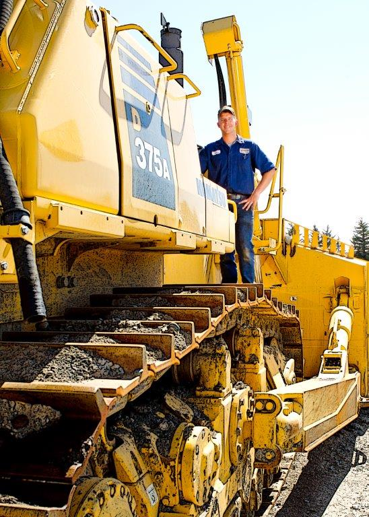Diesel Technology

Certificate of Applied Science (CAS)
Get ready to rev up your career and earning potential by exploring the field of diesel technology at City College. This program is driven by industry demands for technicians that are well-versed in the aspects of diesel technology including heavy-duty equipment, trucks and agriculture applications. Students will build essential skills in the theory and diagnosis of diesel engines, power trains, chassis, hydraulics, electrical systems, and fuel injection systems just to name a few. City College’s diesel technology curriculum has been developed to help set you apart in the current high-demand market. By working closely with faculty and local industry partners, our students have the opportunities to learn the industry’s best practices while developing strong occupational relationships and skills.
Our diesel program operates on a 60/40 ratio. Meaning that 60% of the time you are in the lab doing hands-on, skilled work, and 40% of the time is devoted to learning theory and foundational knowledge. The diesel program and faculty at City College feature National Automotive Technicians Education Foundation (NATEF) certified curriculum which is a division of Automotive Service Excellence (ASE). This certification helps to ensure our training is relevant and setup to provide students with the desired skills that employers are seeking. We invite you to explore our Diesel technology program and allow us the opportunity to provide you the career-establishing educational experience that City College offers.
Diesel Technicians
| Median Wage (MT)* | $57,060 yearly |
| $27.43 per hour | |
|
|
|
| Median Wage (US)* | $60,640 yearly |
|
$29.15 per hour |
|
City College entry-level wages of graduates:$57,166 (2021-2023)** |
|
|
|
|
| Expected Growth (MT)* | 9% |
| Expected Growth (US)* | 3% |
|
*Bureau of Labor Statistics, Office of Employment Projections; MT Dept. of Labor and Industry, Research and Analysis Bureau; 2024 (projections through 2033) |
|
As a Diesel Mechanic, you will find employment in a variety of settings, such as:
- Major Dealerships
- Truck, Tractor and Automotive Shops
- Specialty Shops (Hydraulics)
- Heavy-duty construction companies
- Agri-Business
- Mines
Examples of where recent City College graduates are working:
- CMG Construction, Billings, MT
- Modern Machinery, Billings, MT
- Cummins, Billings, MT
- Torgersons LLC, Billings MT
ADMISSION TO CITY COLLEGE
- First-time college students must have high school diplomas from an accredited high school, a GED/HiSET, or passed the MSUB Readiness Exam offered through our university.
- Transfer students will need to submit records from all regionally accredited institutions.
Montana State University Billings is accredited by the Northwest Commission of Colleges and Universities (NWCCU).
In addition, the Diesel Technology program at City College is accredited by the National Automotive Technicians Education Foundation (NATEF).
Upon completion of this program, students are encouraged to sit for the ASE (Automotive Services Excellence) Certification Tests.
Diesel Technology » »
Diesel Technology
A student may exit this program after completing two semesters and receive a Certificate of Applied Science (CAS) in Diesel Technology. For those wanting to attend four semesters, the college offers an Associate of Applied Science degree (AAS) in Diesel Technology.
Diesel Technology » »
Students who earn an AAS degree and want to further their education, and thus career, are able to go on for a Bachelor of Applied Science (BAS) Degree through MSU Billings. Students can focus on various thematic concentrations to earn a BAS degree. Contact the MSU Billings Advising Center at 406-657-2240 for further details.
Q: Is this program hands-on?
A: Yes! The majority of your time in the program is spent working hands-on in our high-tech lab. Our program operates on a 60/40 ratio. Meaning that 60% of the time you are in the lab doing hands-on, skilled work, and 40% of the time is devoted to learning theory and foundational knowledge. Our program contains core diesel classroom work to help build a strong foundation for how the industry works and some general education courses to help not only land your dream job but to continue growing within your field.
Q: What skills are covered in the program?
A: The Diesel AAS degree covers:
- Diesel Engine: Covers the theory, design, operation, diagnosis, repair and service of diesel engines used in trucks, agricultural, marine and stationary applications
- Overhaul: Machining and dyno-testing are utilized to give students practical experience
- Power Train: Chassis and Maintenance: Includes the design, operation, diagnosis, and service procedures for power train and chassis components used in heavy-duty equipment, trucks and agricultural applications
- Hydraulics and Preventative Maintenance: Diagnostic analysis and overhaul of pumps, valves, and cylinders are covered in both the lab and classroom settings
- Electrical Systems: Covers electrical systems (charging, starting, wiring and schematic systems) on automotive,
mid-range, heavy-duty trucks and off-road equipment
- Fuel Injection Systems: Training on manual and electronic fuel injection systems
Q: Do I have to purchase my own tools?
A: Yes, there are required tools for the Diesel Technology program. These required items are tools that you will need to own and continue to use when you begin a career in the Diesel field, purchasing a good set of tools as a student is a long-term investment in your career. Please visit the Tool Room Website for more information on required tools.
Q: When do I need my tools by?
A: It is highly recommended that students wait until the first week of classes to purchase any new tools. At the beginning of each fall and spring semester, City College invites tool vendors to campus to display and sell their tools at discounted prices (usually around 50% discounts).
